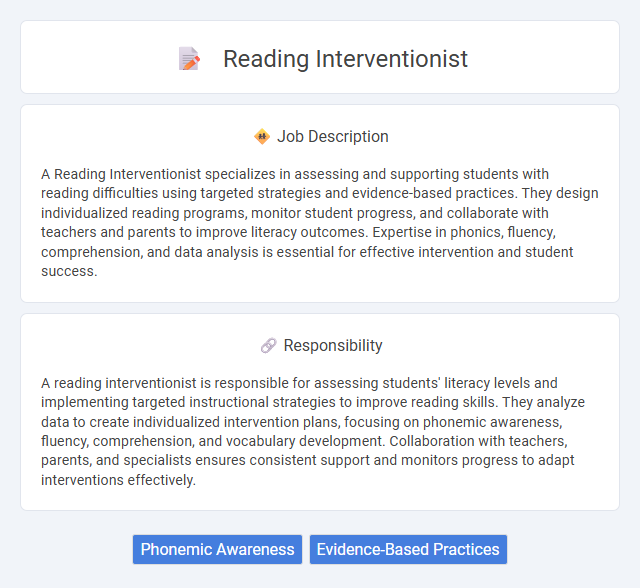
A Reading Interventionist specializes in assessing and supporting students with reading difficulties using targeted strategies and evidence-based practices. They design individualized reading programs, monitor student progress, and collaborate with teachers and parents to improve literacy outcomes. Expertise in phonics, fluency, comprehension, and data analysis is essential for effective intervention and student success.
People with a strong passion for literacy and patience are likely suitable for a reading interventionist role, as it involves working closely with struggling readers who need personalized support. Those who excel in communication and can adapt teaching methods to diverse learning styles have a higher probability of success in this job. Conversely, individuals who find managing behavior challenges or repetitive instruction difficult might experience lower satisfaction or effectiveness in this position.
Qualification
A Reading Interventionist must possess a strong background in literacy education, typically requiring a bachelor's or master's degree in education or reading specialization. Certification in reading instruction, such as the Reading Specialist credential or literacy endorsement, enhances eligibility. Proven experience with evidence-based intervention strategies and the ability to analyze student data to tailor instruction are essential qualifications.
Responsibility
A reading interventionist is responsible for assessing students' literacy levels and implementing targeted instructional strategies to improve reading skills. They analyze data to create individualized intervention plans, focusing on phonemic awareness, fluency, comprehension, and vocabulary development. Collaboration with teachers, parents, and specialists ensures consistent support and monitors progress to adapt interventions effectively.
Benefit
Reading interventionist roles likely offer significant benefits including improved student literacy outcomes and personalized support for struggling readers. These positions probably enhance educators' expertise in targeted reading strategies, contributing to professional growth. Improved student engagement and academic performance might also result from effective reading interventions.
Challenge
Reading interventionist roles likely involve significant challenges in addressing diverse learning difficulties among students. Some obstacles may include diagnosing specific reading issues and tailoring interventions to meet individual needs effectively. Success often depends on the ability to adapt strategies in dynamic classroom environments.
Career Advancement
A Reading Interventionist plays a crucial role in supporting struggling readers by implementing targeted literacy strategies and progress monitoring tools. Career advancement opportunities often include moving into instructional coaching, curriculum development, or literacy specialist roles within school districts or educational organizations. Gaining advanced certifications and continuing education in literacy or special education increases prospects for leadership positions and higher salaries.
Key Terms
Phonemic Awareness
A Reading Interventionist specializing in phonemic awareness implements targeted strategies to help students recognize and manipulate individual sounds in words, a foundational skill for successful reading. This role involves using evidence-based programs to assess phonemic deficits and deliver personalized instruction that improves decoding, spelling, and overall literacy. Mastery in phonemic awareness supports early reading development and reduces long-term reading difficulties for diverse learners.
Evidence-Based Practices
A Reading Interventionist employs evidence-based practices such as phonemic awareness, guided reading, and systematic phonics instruction to improve literacy skills among struggling readers. They utilize data-driven assessments to tailor individualized interventions that align with current research on effective reading strategies. Collaboration with educators and continuous progress monitoring ensure that interventions are impactful and support student growth in reading proficiency.
 kuljobs.com
kuljobs.com